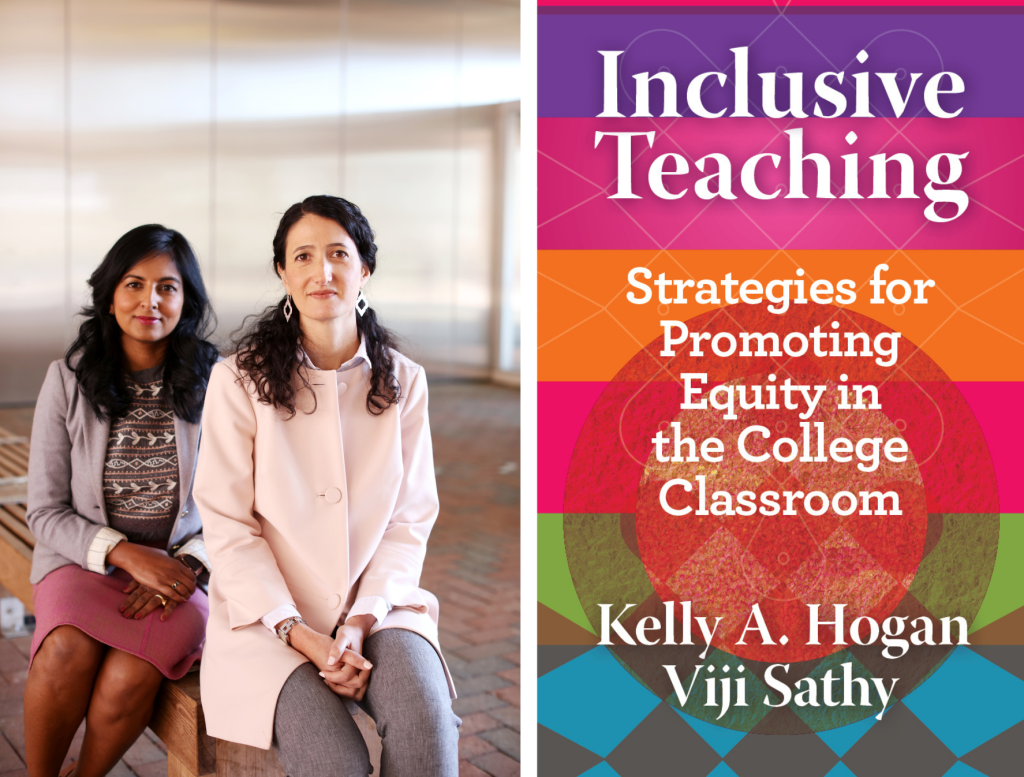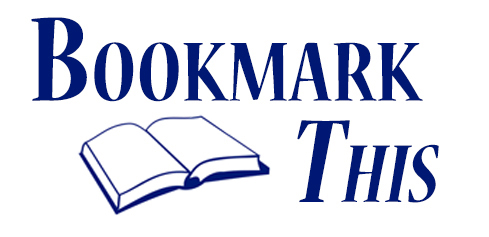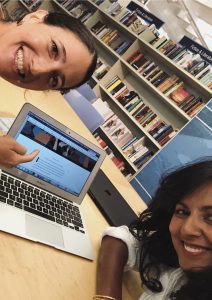Bookmark This is a feature that highlights new books by College of Arts and Sciences faculty and alumni, published the first week of each month. This month’s featured book, just in time for back to school, is Inclusive Teaching: Strategies for Promoting Equity in the College Classroom (West Virginia University Press) by Kelly A. Hogan and Viji Sathy.

 Q: Can you give us a brief synopsis of your book?
Q: Can you give us a brief synopsis of your book?
A: Our book is a practical guide that considers how decisions we make as educators can include or exclude certain students. We focus on a framework that does not blame students for the differences they bring to the classroom but examines the structure of the course design and the classroom environment in promoting inclusion and equity. We want our colleagues to feel that an individual instructor can make a meaningful impact. While this sounds like a big lift, it is important to us to provide hands-on tips and approaches that are not overwhelming to implement. We recognize that we don’t have all the answers, but we hope our readers will feel they have a primer to expand it further in their own teaching.

Q: How does this fit in with your research interests and passions?
A: The book is rooted in our many years teaching thousands of students in introductory STEM courses at Carolina. We noticed problems in our own courses, such as inequities in performance or differences in belonging. We approached these problems the way we had been trained as scientists right here at Carolina (Kelly got her graduate degree here, and Viji her undergraduate and graduate degrees). We devised ways to evaluate the approaches we used and published these findings. Excitingly, our scholarship demonstrated our success in narrowing performance disparities between student groups, reducing failure rates, increasing interest in the subjects and affecting student feelings of inclusion (You can read more about our work here.)
We both also work in the Office of Undergraduate Education, and we are passionate about the broader systems view — collegewide. Kelly’s work centers around curricular change, such as incorporating research and making into courses and the implementation of the new IDEAs in Action general education curriculum. Viji’s work is around evaluation and cultivating faculty scholarship of teaching and learning through a new initiative called the Townsend Program for Education Research. Along with collaborators, we lead AAU and HHMI grant-funded projects that aim to scale up inclusive techniques across introductory STEM courses at Carolina and examine methods of evaluating effective and inclusive teaching.
Q: What was the original idea that made you think: “There’s a book here?”
A: Our published research garnered a lot of interest among educators across the country, and we were approached to share our work in various talks. We felt it was important to discuss not just the results, but the “why” someone would want to make changes in their teaching and model concrete practical tips that could be implemented immediately. We decided to pair up and created our own interactive workshop that would accomplish our shared goals. The feedback from participants at various institutions helped us see how valuable and empowering faculty found our approach. Our experiences as educators and scientists with “boots on the ground” implementation of these ideas in very large classes seemed to help participants overcome perceived barriers, too. Gratefully, through over 200 workshops over the years at community colleges, research universities, small privates, large regional state schools and more, we learned what resonated with educators and how we might recommend practical changes that apply to any discipline.
In 2019, we had the good fortune to write an advice piece on this topic for The Chronicle of Higher Education. The positive reception that this article received helped us to see that we might be able to write something broader and deeper about inclusive approaches. It’s funny, in the book we note that we are generally fairly quiet people, so it is amusing to us that we have amassed a whole book’s worth of things to share on this topic. That must mean we’re passionate about it!
Q: What surprised you when researching/writing this book?
A: A pandemic surprised us! It changed everything for us in our own lives, and we had to shift priorities to learn to teach inclusively in remote and hybrid formats. We also spent a lot of effort helping other Carolina faculty and graduate student instructors learn these strategies. Since we were still in the thick of writing when the pandemic began, we incorporated some of what we and others were learning about inclusion and equity in emergency remote situations. Our message of bringing more structure to the classroom had to be tempered with balance around flexibility. The pandemic taught us, and continues to teach us, a great deal.
Q: Where’s your go-to writing spot, and how do you deal with writer’s block?
A: We did a lot of brainstorming and outlining of chapters together on airplanes (on our way to workshops), coffee shops, and once the pandemic hit, on Viji’s porch. We tried to make these sessions fun and social for us with treats and drinks. We focused on assigning specific components to each other to draft or review and building each other’s confidence about writing. Because we worked so closely together, we really didn’t have writer’s block, but we were challenged by each other’s schedules in the normal ebb and flow of the academic year and parenting. It was a lot of work, but much more enjoyable together than if we were at it alone!
Kelly A. Hogan is associate dean of instructional innovation, QEP director and STEM teaching professor in the department of biology. Viji Sathy is associate dean for evaluation and assessment, director of the Townsend Program for Education Research, director of the Academic Leadership Program at the Institute for the Arts and Humanities and a professor of the practice in the department of psychology and neuroscience. The book was recently reviewed in Science.
Nominate a book we should feature by emailing college-news@unc.edu. Find previous “Bookmark This” features by searching those terms on our website, and add some books to your reading list by checking out our College magazine books page
